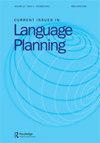语言帝国主义、英语与发展:对哥伦比亚的启示
IF 1.8
1区 文学
Q2 EDUCATION & EDUCATIONAL RESEARCH
引用次数: 10
摘要
本文批判性地分析了英语与发展领域的研究在多大程度上支持了英语有助于发展的说法。特别提到了哥伦比亚的情况,哥伦比亚和其他几个拉丁美洲国家近年来通过一系列举措优先考虑英语教学。为此,本文强调了英语技能在发展中国家或多或少有用的领域,特别是在哥伦比亚,并确定了可能影响英语在发展中的作用的因素。为了便于分析,本文借鉴了菲利普森的语言帝国主义理论。牛津大学出版社,1992)语言帝国主义理论和相关文献,其中着眼于英语的作用和发展在全球南方。本文认为,尽管英语可以促进就业、贸易、移民和教育等领域的发展,但这取决于一系列个人和环境因素,包括英语水平和社会经济地位。也有人认为,不管英语对发展的贡献如何,全球北方的利益正受益于这种语言在发展中环境中的扩散。本文章由计算机程序翻译,如有差异,请以英文原文为准。
Linguistic imperialism, English, and development: implications for Colombia
ABSTRACT This article critically analyses the extent to which research in the field of English and development in the global South supports the claim that English can contribute to development. Particular reference is made to the Colombian context, which, along with several other countries in Latin America, has prioritised English language teaching in recent years through a series of initiatives. In doing so this paper highlights domains where English skills may be more or less useful in developing contexts in general and in Colombia more specifically and identifies factors which may influence the role of English in development. To aid in this analysis, this article draws on Phillipson’s (Linguistic imperialism. Oxford University Press, 1992) theory of linguistic imperialism and relevant literature which looks at the role of English and development in the global South. The paper argues that although English may foster development in domains such as employment, trade, migration, and education, this is contingent upon a range of personal and contextual factors including level of Englishand socioeconomic status. It is also argued that, regardless of the contribution that English can make to development, interests in the global North are benefitting from the proliferation of this language in developing contexts.
求助全文
通过发布文献求助,成功后即可免费获取论文全文。
去求助
来源期刊

Current Issues in Language Planning
Multiple-
CiteScore
4.80
自引率
16.70%
发文量
26
期刊介绍:
The journal Current Issues in Language Planning provides major summative and thematic review studies spanning and focusing the disparate language policy and language planning literature related to: 1) polities and language planning and 2) issues in language planning. The journal publishes four issues per year, two on each subject area. The polity issues describe language policy and planning in various countries/regions/areas around the world, while the issues numbers are thematically based. The Current Issues in Language Planning does not normally accept individual studies falling outside this polity and thematic approach. Polity studies and thematic issues" papers in this journal may be self-nominated or invited contributions from acknowledged experts in the field.
 求助内容:
求助内容: 应助结果提醒方式:
应助结果提醒方式:


